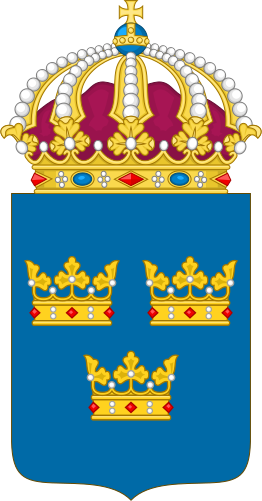Location
The Government of the Kingdom of Sweden (Swedish: Konungariket Sveriges regering) is the national cabinet and the supreme executive authority of Sweden. The short-form name Regeringen ("the Government") is used both in the Fundamental Laws of the Realm and in the vernacular, while the long-form is only used in international treaties.
The Government operates as a collegial body with collective responsibility and consists of the Prime Minister—appointed and dismissed by the Speaker of the Riksdag (following an actual vote in the Riksdag before an appointment can be made)—and other cabinet ministers (Swedish: Statsråd), appointed and dismissed at the sole discretion of the Prime Minister. The Government is responsible for its actions to the Riksdag.
Following the adoption of the 1974 Instrument of Government on 1 January 1975—the Government in its present constitutional form was constituted—and in consequence thereof the Swedish Monarch is no longer vested any nominal executive powers at all with respect to the governance of the Realm, but continues to serve as a strictly ceremonial head of state.
From wikipedia article Government of Sweden
Members:
Resources
Displaying 16 - 20 of 21Act relative to taxation of fertilizers (1984:409).
This Act imposes a tax on pesticides to be paid to the Central State on marketing of fertilizers in the country. "Fertilizers" is defined in section 1 so as to include ammoniac and kalium calcium nitrate. The tax consists of a flat tax of 30 krones per gram of cadium in excess of the proportion one to five with phosphor. Those who are liable to pay the tax are producers of pesticides for commercial purposes, importers of pesticides for commercial purposes and those who are registered as resellers. Tax shall be paid at the moment of sale. (9 sections)
Act relative to the management of natural resources (1987:12).
An Act to make provision for the ecologically, socially and economically sustainable use of natural resources, i.e. land, water and the physical environment (sect. 1).The Act is divided into 6 Chapters: Introductory provisions (1); Basic management provisions (2); Particular management provisions for specified areas in the country (3); Admission testing for industrial plants, etc. (4) Environment impact assessment statements (5); Duties of authorities, distribution of responsibilities, etc.
Act relative to taxation of pesticides (1984:410).
This Act imposes a tax on pesticides to be paid to the Central State authorities on marketing of pesticides in the country. "Pesticides" is defined in section 1 so as to include, among other substances, means of control of pests of animals and diseases. The tax consists of a flat tax of a fee per kilogram of active substance in products marketed. Those who are liable to pay the tax are producers of pesticides for commercial purposes and importers of pesticides for commercial purposes. Tax shall be paid at the moment of sale. (8 sections)
Act relative to administration of certain agricultural real property in common ownership.
A real property that has been assessed as an agricultural unit which is owned by 3 or more persons is rules by provisions as laid down in sections 2 to 6 of the present Act relative to common ownership rights. An agreement between owners, which is in contravention with these provisions, shall be non-valid (sect. 1). The owners shall be represented by a representative who shall be registered in the real property register. The representative shall act current transactions in accordance with directions provided by the common owners.
Act relative to the obligation to provide information in the agricultural sector.
This Act imposes the obligation to provide information on operations for persons who operate in agriculture and forestry and traders in commodities as defined in section 1. These persons shall provide information on means of production, farming, and use of land and use of energy as specified in section 2. The information is used for statistical purposes and for the Register of agricultural enterprises. An authority to be appointed by the Government shall collect the information. The State Agricultural Agency shall carry out control functions in the framework of this Act. (10 sections)


